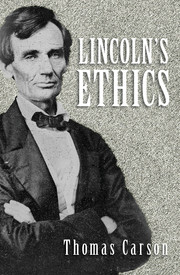Book contents
- Frontmatter
- Dedication
- Epigraph
- Contents
- Detailed Contents
- List of Maps and Figures
- Acknowledgments
- How This Book Came to Be
- 1 Introduction
- PART ONE LINCOLN THE POLITICIAN AND COMMANDER IN CHIEF
- PART TWO LINCOLN'S MORAL CHARACTER
- 7 Lincoln's Virtues
- 8 Other Salient Features of Lincoln's Character and Personality
- 9 Lincoln's Marriage and Family Life, and What They Reveal about His Character
- 10 Was Lincoln a Racist?
- 11 Conclusion
- Bibliography
- Index
- Plate Section
8 - Other Salient Features of Lincoln's Character and Personality
from PART TWO - LINCOLN'S MORAL CHARACTER
Published online by Cambridge University Press: 05 May 2015
- Frontmatter
- Dedication
- Epigraph
- Contents
- Detailed Contents
- List of Maps and Figures
- Acknowledgments
- How This Book Came to Be
- 1 Introduction
- PART ONE LINCOLN THE POLITICIAN AND COMMANDER IN CHIEF
- PART TWO LINCOLN'S MORAL CHARACTER
- 7 Lincoln's Virtues
- 8 Other Salient Features of Lincoln's Character and Personality
- 9 Lincoln's Marriage and Family Life, and What They Reveal about His Character
- 10 Was Lincoln a Racist?
- 11 Conclusion
- Bibliography
- Index
- Plate Section
Summary
This chapter attempts to give a more complete picture of Lincoln than the one presented in Chapter 7 by describing other salient features of his character and personality. Some of these characteristics were morally virtuous, and some enhanced or diminished other virtues that he possessed. This chapter shows that he was immature and had many rough edges as a young man, but it also reveals his capacity for growth and self-improvement.
1. Lincoln was melancholy and given to depression. His melancholy was closely connected with his keen awareness of human mortality.
When he was nine years old, he suffered greatly from the death of his mother soon after his great-aunt and great-uncle Betsy and Thomas Sparrow died. The Sparrows were a child- less couple who raised his mother and were his neighbors and surrogate grandparents. He also grieved the death of his sister Sarah when he was eighteen and the death of his first (and perhaps greatest) love, Anne Rutledge, when he was twenty-six. Later, he was heartbroken by the deaths of his sons Edward and Willie. Willie's death in the White House at the age of eleven from a lingering illness was particularly hard on him (see Chapter 7.IV).
His preoccupation with human mortality was reflected in his taste in poetry. He loved poetry, and his favorite poem was said to be William Knox's “Mortality.” Here is part of that poem:
Oh! why should the spirit of mortal be proud? Like a swift-fleeting meteor, a fast-flying cloud A flash of the lightning, a break of the wave He passeth from life to his rest in the grave. …
'Tis the wink of an eye – 'tis the draught of a breath–
From the blossom of health to the paleness of death, From the gilded saloon to the bier and the shroud:– Oh! why should the spirit of mortal be proud?
Lincoln also greatly loved Poe's poem “The Raven,” which describes a lover's sorrow over the death of his “lost Lenore.”
- Type
- Chapter
- Information
- Lincoln's Ethics , pp. 280 - 307Publisher: Cambridge University PressPrint publication year: 2015

